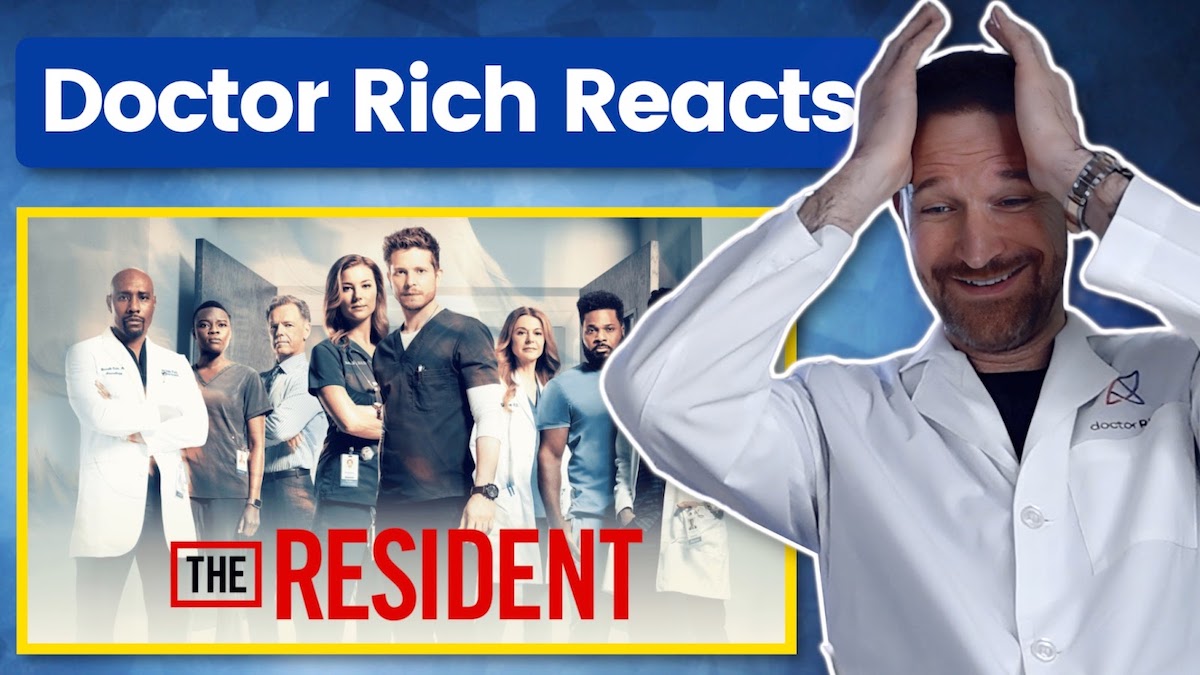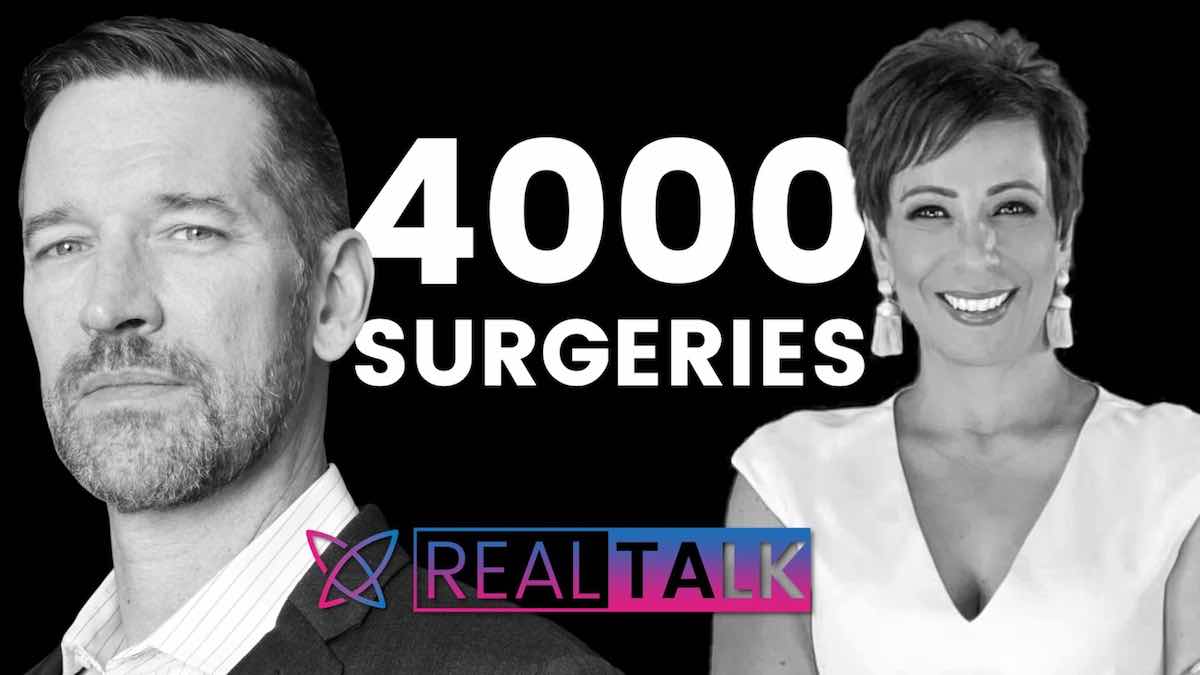Welcome back to the Doctor Rich channel! Today, we’re going to do a “reacts” video to Dr. Schmidt, a gastroenterologist and YouTube sensation who has a hilarious take on many common medical situations. Back by popular demand, we have Veronica Hernandez!
Veronica:
Hello again, guys!
Don’t have time to read this post? Watch the video here instead!
Doctor Rich:
Doc Schmidt explains medical records… to his wife!
Doc Schmidt:
Whew! Had a brutal day at work today!
Mrs. Schmidt:
Oh, I’m sorry! Did one of your patients die?
Doc Schmidt:
Oh, no… Nothing like that. I was just in the clinic.
Mrs. Schmidt:
Oh, okay.
Doc Schmidt:
But I had a LOT of new patients.
Mrs. Schmidt:
Oh, gotcha. So lots of old medical records to review?
Doc Schmidt [exasperated]:
We didn’t even have their records!
Mrs. Schmidt:
Why did the patients come in, then?
Doc Schmidt:
What?
Mrs. Schmidt:
Shouldn’t they get you their records ahead of time?
Doc Schmidt:
Well, yeah, sometimes they do — but often it’s not even the records I need!
Doctor Rich [sarcastically]:
Like that never happens…
Veronica:
Happens all the time!
Doctor Rich [laughing]:
So there should be (ideally) the central repository for all medical records that physicians can get access to. And I think a lot of patients just kind of have that expectation. Unfortunately, the healthcare system isn’t run by Elon Musk, and all of the medical records are spread out through a dozen different EMRs (or medical electronic records systems) that don’t communicate with each other!
Different healthcare systems, hospital systems, academic institutions, military hospitals… and none of those systems talk to each other!
Not to mention that despite an enormous push over the last decade to convert everything to electronic — there’s still a lot of handwritten notes out there that are frankly undecipherable!
Veronica:
Yep. I can attest to that!
Mrs. Schmidt:
They don’t just send everything?
Doc Schmidt:
Well, I don’t WANT them to send everything…
Mrs. Schmidt [confused]:
Okay… so why are they sending you what you don’t want?
Doc Schmidt [emphatically]:
I don’t know! They aren’t specialists in my area, so they don’t always know — for example — that I don’t want the pathology report in addition to the procedure report.
Doctor Rich:
I need the op note, the history, and physical, and the path report. I don’t want seven thousand pages of other stuff!
It’s really just this system that’s designed to make it easy to input information. So it’s a bunch of “click yes/no,” “rate on a scale,” auto macro text that goes in — but it’s really not that much more decipherable than the handwritten notes! Instead of having one barely legible handwritten note, you have forty-three pages of just stock text “answer yes/no” that’s completely meaningless!
Veronica:
Yeah — I couldn’t agree more!
Mrs. Schmidt:
Can’t your nurse or medical assistant do that?
Doc Schmidt:
There’s too many patients for them to do that, and different patients need different studies!
Mrs Schmidt [trying to understand]:
Okay… so then why do you make the patients come in?
Doc Schmidt:
So I can ask them what tests and studies they’ve had!
Mrs. Schmidt:
And then bring the records along?
Doc Schmidt:
Not usually, no.
Mrs. Schmidt [still trying to make sense of the process]:
Okay… so then you can call their old doctor and have them email the records over?
Doc Schmidt:
No, it has to be a fax.
Mrs. Schmidt [in disbelief]:
A fax?!
Doc Schmidt:
Yeah — but usually it doesn’t end up coming through, or we have to, like, request it multiple times.
Doctor Rich [amused]:
It seems like an anachronism — that people would use a fax in 2022 — but that’s really the rule rather than exception for transmitting healthcare records!
Veronic:
Yeah. And you have to be very careful with that too…
Doctor Rich:
Yeah.
Veronica
…making sure you’re sending it to the right place.
Doctor Rich:
Right?! You send it to the wrong fax number — like one digit is off — and then all of a sudden you’ve got a HIPAA violation! And you know, everybody goes to medical records jail!
Mrs. Schmidt [sarcastically]:
I can’t imagine how relying on a piece of technology from the 1960s might cost delays!
Doc Schmidt:
Usually the records come in days later — and half the time it’s still the wrong stuff anyway!
Mrs. Schmidt:
So then what do you do?
Doc Schmidt:
We usually just end up repeating the tests that the patient already had done.
Mrs. Schmidt [gets up and leaves, giving up on understanding]:
Okay. None of this makes sense!
Doctor Rich:
So you’ve seen that — where patients end up getting tests done over again, just because they can’t get the records?
Veronica:
Yeah — and then they end up getting upset because they already had that test done.
Doctor Rich:
I mean (from the practitioner standpoint) it’s difficult because as he said (and you point out) we don’t have the records! They don’t automatically get sent — ever! Occasionally a patient is a staunch self-healthcare advocate and they bring copies of all of their stuff. And then the challenge there — like he’s pointed out — most of the time, it’s the wrong stuff! They’ve got labs from 17 years ago that are meaningless or stuff that doesn’t pertain to urogynecology or our area of expertise.
Veronica:
Yeah — and sometimes it’s just a discharge summary with some patient education… and nothing to do with the results!
Doctor Rich [laughing]:
That’s right! And they’ll bring in something that’s meant for them — but doesn’t transmit any meaningful information to the medical provider.
[a second video begins where Doc Schmidt is talking with another doctor (also played by himself)]
Doc Schmidt:
So that lady in 19? Her chest x-ray just came back — she has pneumonia.
Doc 2:
Oh, okay. Did you start her on azithromycin and ceftriaxone?
Doc Schmidt.
I was going to…
Doc 2 [looking at her chart]:
Blood pressure’s a little bit low too. Maybe give her a liter of fluid.
Doc Schmidt
There’s something you should know…
Doc 2:
What is it?
Doc Schmidt:
She’s two months pregnant.
Doc 2 [fearfully]:
What?!
Doc Schmidt [trying to remember the letter/number codes from her chart]:
Yeah. G2 P1 3 G2?
Doc 2:
Are you sure that’s right?
Doc Schmidt:
No.
Doc 2 [panicked]:
What do we give her?
Doc Schmidt:
Well we can’t give her azithromycin and ceftriaxone! What if that hurts the baby?
Doc 2
Well, maybe those are safe in pregnancy?
Doc Schmidt
Who knows?!
Doc 2:
We could Google it, I guess…
Doctor Rich [laughing]:
If all else fails, Google it — even in medicine!
So in OB, there’s like a numeric description that comes with gravid and para — and there’s one digit on the first one and four digits on the next one… and it’s supposed to account for every possible pregnancy outcome (from miscarriage, to ectopic, to live birth). And unless you do this all the time, it completely confounds other specialties that have no idea what it means! This is funny because you think that if you’re a healthcare professional or a doctor — you’re going to be able to understand what other people’s shorthand means. But most specialties have their own shorthand that no other specialties have any idea what they’re talking about.
Veronica:
Yeah. It’s very true. I’ve seen it.
Doctor Rich:
So you’ve rotated through all these specialties. Is it like everybody has their own different nomenclature than nobody understands?
Veronica:
Yeah. And like you said, with mother/baby, I did it. And the GTP — it’s something that people are like, “What?!”
Doctor Rich:
Like “What is that?!” They don’t even know. They’re saying it, and they don’t even know what it means!
Doc 2:
No, let’s call OB — they should admit her! She’s pregnant!
Doc Schmidt:
I tried calling them, but then they started asking a lot of questions I didn’t understand. So I just hung up!
Doc 2:
What?!
Doc Schmidt:
Something about gestation?
Doc 2
Guess we’re on our own…
Doctor Rich:
So that, that’s a tricky one here — because if it’s an admission for primarily a medical condition (and it’s considered to be prior to viability), OB is not going to want to be responsible for the admission. Perhaps they’ll round, but they don’t want to take that as a primary admission that goes back to medicine. But it’s a constant turf war between those two specialties — as far as who should get the admission. That being said, we reacted to another video (you can check out this link here) where they talk about all the doctors in other specialties having no idea what you can do with a pregnant patient — as if they’re some kind of an alien or something like that!
Doc 2:
Let’s come back to that. We can still give her fluids, right?
Doc Schmidt:
I don’t know!
Doc 2:
I mean, fluids can’t hurt the baby, right? The mom DRINKS fluids!
Doc Schmidt:
We’re talking about IV fluids.
Doc 2:
Shoot — you’re right!
Doc Schmidt:
And is this blood pressure even low for a pregnant woman?
Doc 2:
No clue… maybe my mom will know…
Doc Schmidt:
Is your mom an OB/GYN?
Doc 2:
No, but she was pregnant a couple times…
Doc Schmidt:
Oh, no… the nurse just paged. The patient has a fever of 101!
Doc 2:
Tylenol?
Doc Schmidt [nervously unsure]:
Uhhhh…
Doc 2:
I’m calling my mom!
Doctor Rich:
So it is amazing how little all other specialties know about obstetric care and what things can and can’t be done.
Veronic:
Well, I think it’s also a constant fight — or not a fight, but a conflict — between nurses.
Doctor Rich:
Oh, really?
Veronica
ER and labor and delivery nurses.
Doctor Rich:
Yeah.
Veronica:
“Are you gonna take that patient?” And it’s like, “No, you keep that patient!” It’s like you said, if it’s not yet viable… certain weeks, they come up.
Doctor Rich:
There are certainly medicines — very few — that are always safe in pregnancy (basically Tylenol and vitamins). And I guess I should put a caveat: as long as they’re not having liver failure. And there are certain medications that are never safe in pregnancy — like ribavirin and accutane. All other medicines are basically a risk/benefit proposition. Penicillins are generally safe throughout the entire pregnancy. So if that was perfectly not confusing, consult an OB!
As a healthcare professional AND a mom, do you feel like you have a finger on the pulse of what’s generally good, bad, and safe for a pregnancy?
Veronica:
I’d say as a provider, I have my resources to use — but as a mom, I’d keep it just to Tylenol.
Doctor Rich [laughing]:
Okay. All right, moms — you heard it here first (and that’s generally good advice)! So thanks again for helping us do a “reacts to Dr. Schmidt’s” video!
Veronica:
Of course. Thank you!
Doctor Rich:
If you found this video utterly hilarious, please share and make sure to turn on your notifications. Thanks for joining us!




